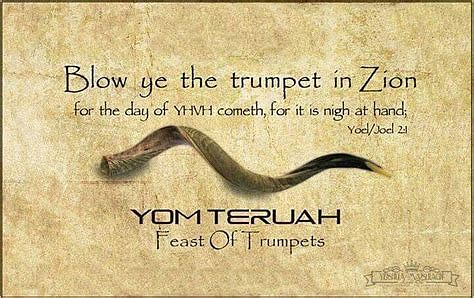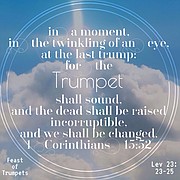Faithful Observations: Feast of Trumpets
For the Lord himself will come down from heaven, with a loud command, with the voice of the archangel and with the trumpet call of God, and the dead in Christ will rise first. After that, we who are still alive and are left will be caught up together with them in the clouds to meet the Lord in the air. And so we will be with the Lord forever. Therefore encourage one another with these words.” (1 Thessalonians 4:15-18)
Today, as you read this column it is Shabbat for Jews around the world and also Rosh Hashanah or the Feast of Trumpets and the beginning of the Jewish new year. Many might be saying, “what does this Old Testament feast or celebration have to do with us today?” Someone once said that the Old Testament is Christ concealed and the New Testament is Christ revealed. The more that you study the scriptures the more you find that this is true.
All nations observe holidays, often in memory of a significant political event, birthdays or holidays centered around religious beliefs. In marked contrast to all of these there were seven Holy Convocations or holidays instituted by God in the 23rd chapter of Leviticus and all are given in chronological sequence. They were intended to be times of meeting between God and man for “holy purposes.” In fact, the apostle Paul said in Colossians 2:16-17 that these celebrations are a “shadow of the things to come” through Jesus Christ. Although Christians may not commemorate these holidays in the traditional Biblical sense, understanding these Jewish festivals may shed light onto God’s redemptive plan.
Four of the feasts were in the spring of the year, they are already a fulfillment by Christ as messiah, they are a “done deal.” The feast of Passover speaks of redemption and this is the day that Christ was crucified as the passover lamb slain for us. The Feast of Unleavened Bread pointed to the Messiah’s sinless life, making Him the perfect sacrifice for our sins. The Feast of First Fruits came three days after Passover and was the day that Jesus resurrected as the the fruits of the righteous. The fourth spring feast was Shavout or Pentecost which came 50 days after first fruits and pointed to the great harvest of souls, both Jew and Gentile. The church was actually established on this day when the Messiah poured out the Holy Spirit and 3,000 souls responded to Peter’s first proclamation of the gospel.
Then several months go by through the summer and there are no more feasts, most scholars refer to this as the “church age” prior to Christ’s return or second coming. There are the last three fall feasts, which are yet to be fulfilled in the life and work of Jesus. These final feasts form the basis for what the Bible calls the “blessed hope” (Titus 2:13). The Feast of Trumpets as we mentioned will be Sept. 18-19 (sundown to sundown). Yom Kippur will follow Sept. 27-28 and the Feast of Tabernacles Oct. 2-9.
Bible scholars believe that the Feast of Trumpets signifies the coming of Christ for his church. The “harpazo” or rapture of the church is pictured in this feast and some believe it may actually take place at this time, although the Bible says no man knows the day or hour and we can’t set a date for that event. One interesting further thought on this feast is appropriate at this point. The Feast of Trumpets occurs on the first day of the Hebrew month of Tishri. It occurs at the appearance of the New Moon when only the slightest crescent is visible. However clouds could obscure the moon, and witnesses were required in ancient days. Watchfulness was a critical ingredient of this feast. The rabbis later added a second day to this feast to make sure they did not miss it. This need for watchfulness and preparedness in connection with the Feast of Trumpets is echoed and reechoed throughout the New Testament in connection with the Messiah’s coming. At the appropriate time the Rabbi blows the trumpet and calls everyone to the temple. All of this reaffirms that we have 66 books by 40 authors that have one story contained in the Bible that invite our deeper study. And what a fascinating study that is!
One final commentary about the Feast of Trumpets, the 10 days following were to be a time for repentance and prayer culminating on Yom Kippur or the Day of Atonement. This fits perfectly for the call to prayer of our nation leading to prayer rallies and a march in Washington, D.C., calling our nation to repentance and seeking God Sept. 26.
“…….in a moment, in the twinkling of an eye, at the last trumpet. For the trumpet will sound, and the dead will be raised incorruptible, and we shall all be changed.” -I Corinthians 15:51-5
•••
Bob’s religion columns appear Saturdays in The Press. Email Bob: bjshill@mac.com



